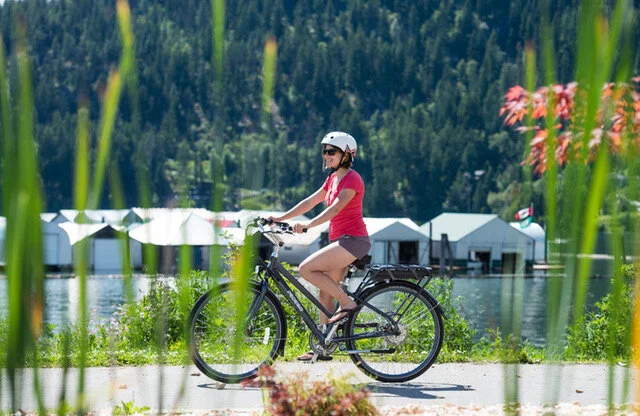Despite the real-world implications of our outdated laws and regulations, it’s not what’s keeps most people up at night. It’s the daily grind. Getting around and paying the bills. And for some people, an extra thousand bucks in their pocket can make a big difference in their decision to get rid of an internal combustion engine for their personal mobility.
Read MoreIn a recent poll, 70% of Kelowna residents supported the building of a cycling grid in their community. As a result, the city is planning for and promoting active transportation; in their most recent official community plan, the City of Kelowna pledged to reduce greenhouse gas emissions 33% by 2030, and providing transportation options for residents that go beyond the motor vehicle is key.
Read MoreAs an advocacy-driven, non-profit society, we feel an obligation to acknowledge our privilege, because even while each of us individually and collectively benefit from this privilege, we can use it in different ways, share it, and give some of it up, so others less privileged can benefit. Even when thinking about and working on transportation issues, we can simultaneously become participants in building a better world.
Read MoreCycling culture in Revelstoke is big. The town boasts a machine-built mountain bike trail of some renown that runs a full vertical drop of 5,620 feet (and named, naturally, the ‘Fifty Six Twenty’). During a normal school year, the bike racks outside the elementary and high schools in town are packed — hundreds of bikes lined up to one another like dominoes. “There’s great potential to connect what we’ve go. The irony here is that everyone rides, but there are no bike lanes.”
Read MoreOn July 7th, BCCC Executive Director Colin Stein spoke to Keith Wiley of Eco-Centric Environment Radio about the funding announcement, about the Nelson bike lane project, and what British Columbians should be asking for from their leaders.
Read MoreHow much and where should the province spend on active transportation — walking, cycling and rolling — going forward? This Friday, June 26th at 5:00pm, the public consultation period closes — this is your chance to make a written, audio and video submission, and answer a government survey about how public money should be spent in 2021-22.
Read MoreBC’s Motor Vehicle Act (MVA) was written in 1957, a time when only 200,000 vehicles were registered province-wide, and bicycles were lumped alongside 'play-vehicles'.
While frequently amended in the subsequent six decades — hundreds of amendments in the last 20 years alone — the continued failure of the MVA to recognize the many different ways our roads are used today has resulted a couple of major issues impacting all British Columbians.
Read MoreThis is no less critical a time for active transportation than any time in the past, and we can reasonably argue it is now THE most important time — to seriously focus on cycling as a transportation solution, as an outlet for physical activity, and as a salve for our emotional fatigue.
Read MoreThis disappointing and somewhat alarming gap in Budget 2020 — and all the related missing pieces in the MoTI Service Plan related to AT — seems to harken back to earlier eras, when cycling was just not part of the provincial conversation. In the ‘80s and ‘90s, active transportation was not really “a thing”, and we had no broad, mainstream cultural imperative driving the everyday discourse towards big, bold moves aimed at resolving existential crises.
Read MoreWith the prospect of the provincial government clearing away legislative hurdles for ride-hailing companies to begin operating in BC next year, the BCCC has issued a white paper entitled, “Making Roads Right for Ride-hailing”.
Read MoreOn Friday, November 30, 2018, the Canadian cycling advocacy community lost a giant in Arno Schortinghuis. It would be impossible the BCCC team to adequately express what Arno meant to the organization, and to cycling in British Columbia, in the nearly two decades he was involved.
Read MoreIn collaboration with the Comox Valley Cycling Coalition and Friends of Rails to Trails Vancouver Island, the BCCC has released a report which identifies opportunities to improve cycling and walking transportation, recreation and tourism in the Mid-Vancouver Island Region, specifically the Comox Valley Regional District.
Read More











